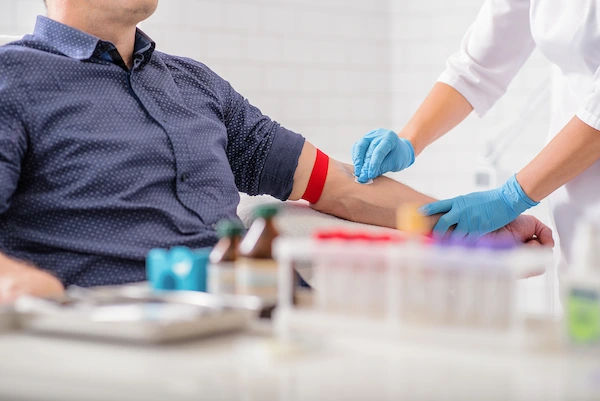Health Tests Adolescents Should Not Miss
Discover essential health tests adolescents should not miss, including screenings for growth, nutrition, mental health, and more to ensure early detection and long-term well-being.

Written by Dr. Shaik Abdul Kalam
Reviewed by Dr. J T Hema Pratima MBBS, Fellowship in Diabetes Mellitus
Last updated on 9th Sep, 2025

Introduction
Adolescence, typically the period between ages 10 and 19, is the transitional phase of growth and development between childhood and adulthood. While many teens appear healthy, this stage can also bring hidden health concerns that may not show clear symptoms. Conditions like anaemia, vitamin deficiencies, or hormonal imbalances can affect a teen’s energy, focus, and overall well-being.
Regular health checkups and lab tests during this time can help detect these issues early, allowing for timely care and support. These tests also give doctors a clearer picture of a teen’s development and nutritional needs. In this article, we’ll explore the essential lab tests that can help adolescents stay healthy, confident, and ready to thrive through their teenage years and beyond.
Why Teen Health Screenings Are Important?
Teen health screenings are key to preventive care. Here’s why these checkups are so important:
- Spotting problems early: Screenings can find health issues like anaemia or hormone imbalances before they get worse, making them easier to treat.
- Tracking growth and development: Doctors check height, weight, and other signs to make sure teens are growing and developing as expected.
- Supporting mental health: Teens often face stress, anxiety, or mood changes. Screenings give them a chance to talk about how they’re feeling and get help if needed.
- Building healthy habits: These visits are a good time to learn about eating well, getting enough sleep, staying active, and making smart choices.
When to Consider Health Tests for Adolescents?
It's recommended for adolescents to have regular check-ups with their paediatrician or family doctor, and these tests can be part of that routine. You should especially consider these tests if your teenager experiences:
- Unexplained Fatigue: Ongoing tiredness that doesn’t improve with rest may point to anaemia, thyroid issues, or nutrient deficiencies.
- Significant Weight Changes: Sudden weight gain or loss without changes in diet or activity levels may indicate metabolic or hormonal imbalances.
- Concerns About Growth: If your teen is growing much faster or slower than peers, or if growth seems to have plateaued unexpectedly, further evaluation may be needed.
- Persistent Skin Problems: Severe acne that does not improve with over-the-counter treatments may relate to hormonal changes or underlying conditions.
- Menstrual Irregularities (in girls): Painful, very heavy, or highly irregular periods can suggest hormonal imbalances or other reproductive health issues.
- Emotional or Behavioural Changes: While mood swings are common in adolescence, marked or persistent changes may benefit from a medical assessment to rule out underlying causes.
- Pale Skin or Dark Circles: These could be signs of iron deficiency or other nutritional gaps.
- Restrictive Diets or Disordered Eating: Teens with very limited diets or those following vegan or other restrictive plans without guidance may need monitoring for deficiencies.
- Family History of Chronic Conditions: If there is a known history of thyroid disorders, diabetes, PCOS, or other inherited health issues, targeted screening may help catch problems early.
Age-Wise Guide and Tips for Making Blood Tests Teen-Friendly
Adolescents should have regular health check-ups tailored to their age, health status, and risk factors. Your doctor can recommend the specific tests your teenager needs based on their development.
To make blood tests easier and less stressful for teens, try these approaches:
- Explain the Purpose: Help your teen understand why the test is important for their health.
- Be Honest: Let them know the test might cause a brief sting but will be over quickly.
- Use Distraction: Suggest they listen to music, watch a video, or look away during the blood draw.
- Ensure Comfort: Make sure they are well-hydrated and have eaten a light meal if fasting is not required.
- Offer Praise: Compliment their courage and cooperation after the test.
Key Lab Tests to Support Healthy Adolescent Development
To support healthy development and address potential concerns in adolescents, specific blood tests can provide crucial insights. These tests help a doctor assess growth markers, hormonal balance, and nutritional status, ensuring your teenager is on the right track.
Growth Markers
What they measure: While growth is primarily monitored by height and weight on growth charts, certain blood tests can investigate underlying issues if growth is atypical.
- Insulin-like Growth Factor 1 (IGF-1): A hormone that reflects growth hormone levels.
- Growth Hormone (GH) Serum: This test directly measures the level of growth hormone in the blood. Growth hormone is essential for normal growth and development during childhood and adolescence.
- Thyroid Function Tests (TSH, Free T3, Free T4): Thyroid hormones are crucial for normal growth and metabolism.
Why they're important: If a teenager is experiencing significant growth delays or accelerations, these tests can help identify hormonal imbalances or other conditions that might be affecting their development, allowing for timely intervention.
Get These Tests For Your Teenagers
Hormone Levels
What they measure: These tests assess the levels of key hormones that drive puberty and overall development.
- Sex Hormones (Testosterone, Estrogen): These hormones are responsible for the physical changes of puberty. Imbalances can lead to delayed or early puberty, severe acne, or menstrual irregularities.
- LH (Luteinizing Hormone) & FSH (Follicle-Stimulating Hormone): These pituitary hormones stimulate the ovaries or testes to produce sex hormones and are key indicators of pubertal progression.
- Prolactin: High levels can sometimes affect menstrual cycles in girls.
Why they're important: Hormonal balance is critical during adolescence. These tests help identify conditions like Polycystic Ovary Syndrome (PCOS) in girls, or other endocrine disorders that can impact physical development, mood, and future reproductive health.
Anaemia Screen (Complete Blood Count - CBC & Iron Studies)
What it measures: These tests check the health of red blood cells and iron stores.
- Complete Blood Count (CBC): Provides counts of red blood cells (which carry oxygen), white blood cells (for immunity), and platelets (for clotting).
- Iron Studies (Ferritin, Serum Iron, TIBC): Measures how much iron is in the blood and how much is stored in the body (Ferritin).
Book Apollo Anaemia Panel Here
Why it's important: Iron deficiency anaemia is common in adolescents, especially girls who have started menstruating. It can cause significant fatigue, weakness, pale skin, and difficulty concentrating, which can impact school performance and overall energy levels. Screening helps identify and address anaemia, restoring vitality.
Nutritional Status (Vitamin D, Vitamin B12)
What they measure: These tests check the levels of essential vitamins.
- Vitamin D Levels: Crucial for bone health (especially during rapid growth), immune function, and can influence mood. Deficiency is widespread among all age groups, including teens.
- Vitamin B12 Levels: Vital for energy production, nerve function, and brain health. Deficiency can lead to fatigue, weakness, and cognitive issues.
Why they're important: Adolescents need optimal nutrient intake for their rapid growth and development. Deficiencies can impact energy, bone strength, mood, and overall well-being.
The results from these essential lab tests, combined with your teenager's symptoms, medical history, and a thorough physical examination, will help their doctor accurately assess their current health status and identify any potential risks. This detailed understanding allows them to create a personalised health plan designed to help your child thrive during adolescence and beyond.
Get Tested Easily with Apollo 24|7
If your doctor recommends essential lab tests to ensure your teenager's health, choosing a reliable and convenient testing service is important. Apollo 24|7 makes this simple by providing accurate lab tests with quick results. This helps you and your doctor understand your child's health clearly and create a personalised plan to support their well-being effectively.
Why Choose Apollo 24|7 for Your Teenager's Health Checkups?
Comprehensive Test Panels: Apollo 24|7 offers access to a range of essential lab tests tailored for adolescents, helping monitor their health during this critical stage of growth and development. These comprehensive test panels may include evaluations for growth markers, hormonal balance, and nutritional status, including tests for anaemia.
- NABL-Accredited Labs: Tests are done in labs certified by the National Accreditation Board for Testing and Calibration Laboratories (NABL), ensuring accurate and trustworthy results.
- Home Sample Collection: Enjoy the convenience of blood sample collection at your home, saving you time and providing privacy.
- Easy Online Booking: Schedule your test quickly and easily through the Apollo 24|7 app or website.
- Fast Digital Reports: Receive secure, detailed test reports online promptly, ready to share with your doctor.
- Trusted Brand: Benefit from the trusted expertise and healthcare legacy of Apollo Hospitals Group, one of India’s most respected medical networks.
By choosing Apollo 24|7, you get access to dependable, convenient diagnostic services that make it easier to understand and manage your teenager's health effectively.
Conclusion
Keeping track of your teenager’s health with essential lab tests is a smart way to support their growth and development during this important life stage. Adolescence brings rapid changes, and understanding their health needs early helps prevent problems and encourages lifelong well-being.
Tests that check for growth, hormone balance, and nutrition can give doctors a clearer picture of your teen’s overall health. With this information, they can recommend steps that boost energy, support focus, and build resilience. If you're a parent, speak with your child’s doctor about the right tests for them, and take a proactive role in setting the stage for a healthier, more confident future.




.webp)
